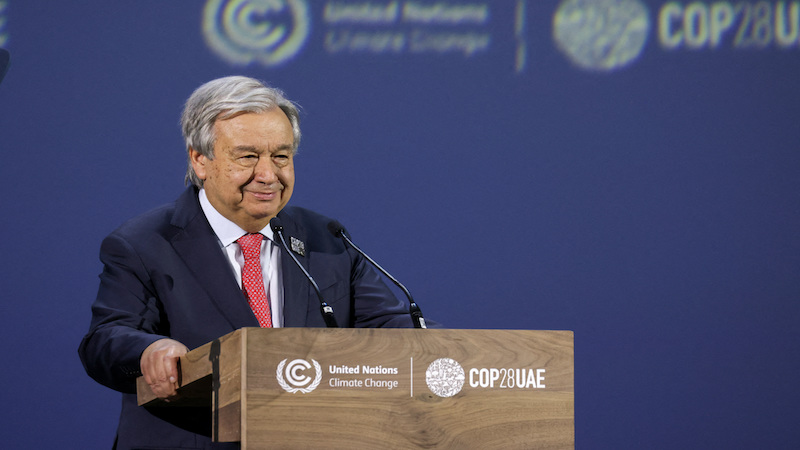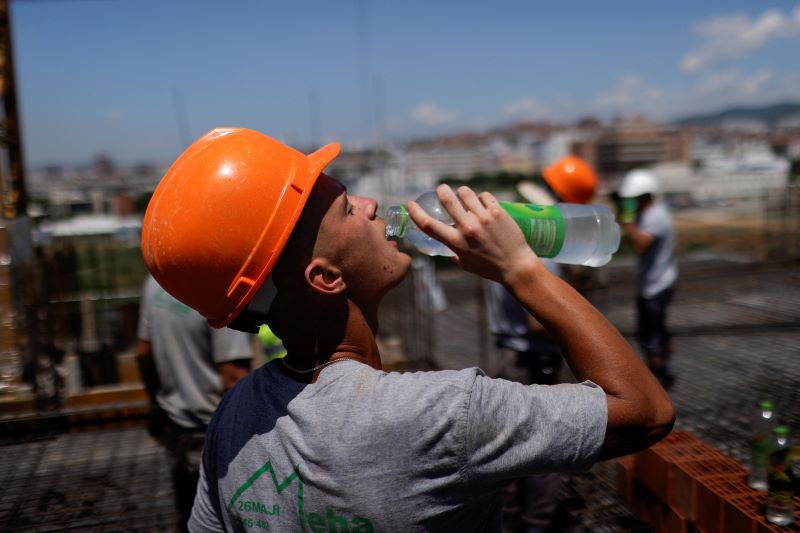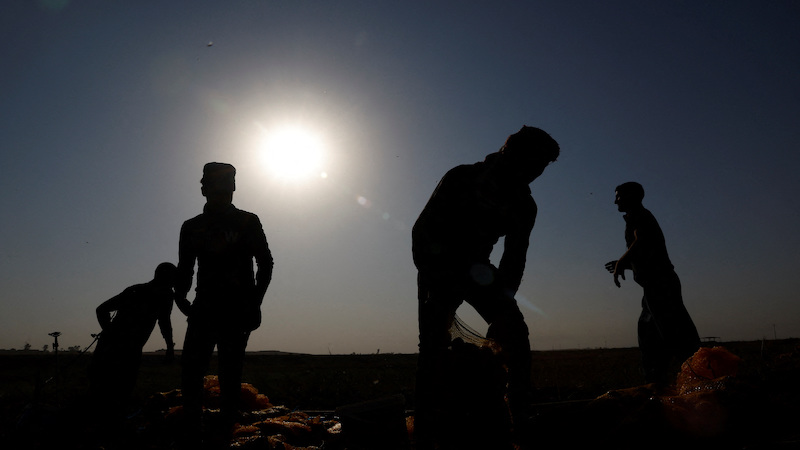People everywhere are struggling with the fatal impacts of worsening extreme heat, which is also damaging economies, widening inequalities and undermining the world’s development goals, U.N. Secretary-General António Guterres said on Thursday.
Calling for global action to limit the devastating consequences, the head of the United Nations said “billions of people are facing an extreme heat epidemic – wilting under increasingly deadly heatwaves”.
Extreme-heat events have been getting more frequent, intense and longer-lasting in recent decades as a result of human-made climate change.
Guterres’ appeal comes as the record for the world’s hottest day was broken twice on consecutive days this week, according to Europe’s Copernicus Climate Change Service. Monday beat Sunday, with the global average surface air temperature reaching 17.16 Celsius, as parts of the world sweltered through fierce heatwaves from the Mediterranean to Russia and Canada.
Guterres said the UN had just received preliminary data indicating that Tuesday “was in the same range”, which would make a third hottest straight day on record, if confirmed.
In a speech, he noted that heat – driven by “fossil fuel-charged, human-induced climate change” – is estimated to kill almost half a million people a year, about 30 times more than tropical cyclones.

United Nations Secretary-General Antonio Guterres speaks during the United Nations Climate Change Conference (COP28) in Dubai, December 1, 2023. COP28/Christophe Viseux/Handout via REUTERS
This year alone, extreme heat struck highly vulnerable communities across the Sahel region, killed at least 1,300 pilgrims in Mecca during Hajj and shut down schools across Asia and Africa affecting more than 80 million children.
“And we know it’s going to get worse. Extreme heat is the new abnormal,” Guterres added in his speech to journalists at UN headquarters in New York.
The Secretary-General’s “call for action” brings together ten specialised UN agencies for the first time in an urgent and concerted push to strengthen international cooperation in addressing extreme heat.
Focus on most vulnerable
Guterres listed four areas where greater efforts could be made to keep people, societies and economies safer from the negative consequences of rising global temperatures.
He emphasised the importance of “caring for the most vulnerable” – with those at greatest risk including poor people in urban areas, pregnant women, people with disabilities, the elderly, children, those who are sick and people who are displaced from their homes.
Households living in poverty often live in substandard homes without access to cooling, he added, appealing for a boost in access to low-carbon cooling and expanded use of natural measures – which include planting trees for shade – and better urban design, alongside a ramp-up of heat warning systems.
Workers also need more protection, he said, as a new report from the International Labour Organization warned that over 70 percent of the global workforce – 2.4 billion people – are now at high risk of extreme heat, especially in Asia-Pacific, Africa and the Arab States.
The UN is calling on governments to urgently review laws and regulations on occupational safety and health to integrate provisions for extreme heat, including the right to refuse working in extreme hot weather.
Energy transition and adaptation
A third area targeted by the UN for action is making economies and societies better able to withstand heat, through stronger infrastructure, more resilient crops, and efforts to ease the pressure on health systems and water supplies.
“Countries, cities, and sectors need comprehensive, tailored Heat Action Plans, based on the best science and data,” Guterres said.
Lastly, the UN chief urged stepped-up action to “fight the disease”, by phasing out fossil fuels “fast and fairly” including no new coal projects, with the aim of limiting global warming to 1.5C – a goal nearly 200 governments signed up to in the 2015 Paris Agreement.
“I must call out the flood of fossil fuel expansion we are seeing in some of the world’s wealthiest countries,” he emphasised. “In signing such a surge of new oil and gas licenses, they are signing away our future.”
The United States, Canada, Australia, Norway and the UK have issued two-thirds of the global number of oil and gas licences since 2020, according to research published by the International Institute for Sustainable Development this week.
‘Still time to act’
Commenting on the UN’s call to action, Alan Dangour, director of climate and health at Wellcome, a UK-based science foundation, noted that people working outside in physical jobs and those who cannot afford to adapt to rising heat are particularly exposed – but the effects are far broader.
“The levels of heat we now routinely see around the world put every part of society under extreme pressure, directly harming our health while also affecting food and water security and much of our vital infrastructures,” he said in a statement.
Speaking to journalists on Thursday, scientists convened by Wellcome said there are positive measures that can be taken to combat the problem of extreme heat, which can also bring wider social benefits.
UAE’s ALTÉRRA invests in fund backing fossil gas despite “climate solutions” pledge
For example, they explained that using community facilities as cooling centres can offer older people a place to chat or play cards, tackling social isolation and heat stress at the same time. Or adding shades with solar panels to market stalls can help women traders keep working on hot days while also providing free electricity for their businesses.
“There is still time for concerted action to save lives from the impacts of climate change, but we can no longer afford to delay,” Dangour said.

A construction worker drinks water while working on a building during hot weather in Pristina, Kosovo, June 19, 2024. (Photo: REUTERS/Valdrin Xhemaj)
The UN’s call for action points out that existing tools to reduce the devastating consequences of extreme heat could be deployed with large and far-reaching effects. Guterres said the good news is that “there are solutions… that we can save lives and limit its impact”.
For example, a global scale-up of heat health warning systems could save more than 98,000 lives every year, according to the World Health Organization. And the rollout of occupational safety and health measures could avoid $361 billion a year in medical and other costs, the ILO has estimated.
The UN chief urged a “huge acceleration of all the dimensions of climate action” as global warming is currently outpacing efforts to fight it. That could start to change, he added, as heatwaves, impacts on public health and disasters such as Canada’s wildfires are now hitting the richest countries as well as poorer ones.
“The heat is being felt by those that have decision-making capacity – and that is my hope,” he said.
(Reporting and editing by Matteo Civillini and Megan Rowling)

